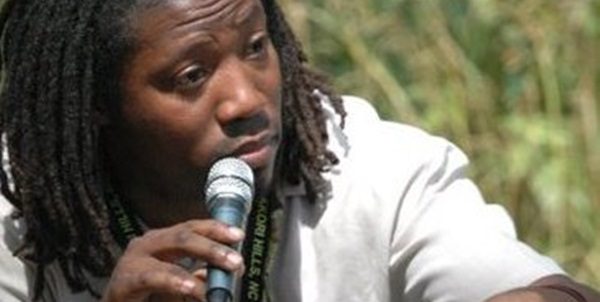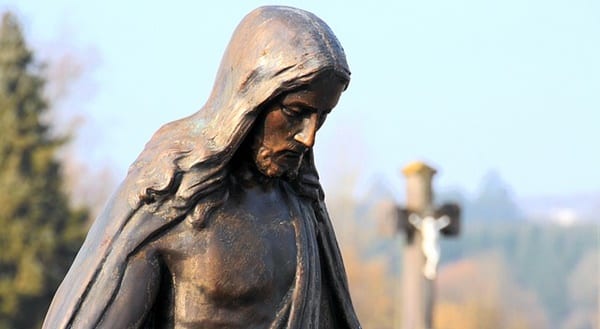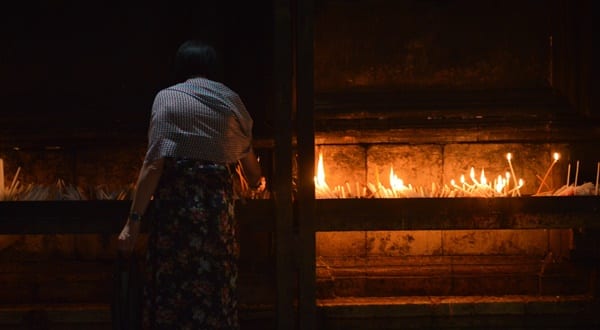 The question, “Am I a Racist?” may be harder to answer than it first appears. Because answering “no” to the question is not necessarily an ironclad defense. Here’s why.
The question, “Am I a Racist?” may be harder to answer than it first appears. Because answering “no” to the question is not necessarily an ironclad defense. Here’s why.
Blind to Our Scapegoats
Racism is a form of scapegoating and scapegoating has a tricky way of hiding in plain sight. Of course, scapegoating is easy to spot in others. We know it when we see it and it’s easy to condemn because we recognize it as a form of injustice. With racism as our test case, this is obvious.
But here’s the tricky part: while we easily recognize scapegoating (and racism) in others, it is extraordinarily difficult to spot it in ourselves. Because to have a scapegoat is not to know you have one. Which is to say that our scapegoats live in a blind spot in our self-awareness. It’s not impossible, but it is rarely the case that someone self-identifies as a racist! We explain our behaviors by saying that we are defending our rights or way of life or protecting our families or their jobs against criminals and bad guys.
But let me be clear: To be a racist is not to know you are one.
Even though there are criminals and bad guys out there, if you have fallen into a racist/ scapegoating pattern, you are most likely gravely mistaken about who the bad guys are and where the threat, if there is one, is coming from.
Unfortunately, denying that you are a racist just might be a symptom of racism! The truth might be that in the stories we’ve been telling we have cast ourselves in the wrong roles. What if the bad guys in the story turn out to be us?
You Can Change the World
Discovering that you are not as good as you thought might not be as terrible as it seems! Sure, realizing you are part of the problem is no ego-boost, but if you are part of the problem, then you can be part of the solution in a way you never realized before.
Think about it this way: if you’re serious about solving the problem of racism in America, then discovering that you can change the world by changing yourself is actually a good thing. Because trying to change other people is, let’s face it, nothing more than an exercise in self-importance because you get to be the good guy. But changing yourself, well, only you can do that and the truth is that you have the power to do it right now. By no longer being willing to play your part in perpetuating racial oppression, you not only make yourself a better person, you make the world a better place for everyone.
Do Better with Melvin Bray
Our guest for this week’s installment of our Raven ReViews Election 2016 series is Melvin Bray, a gifted storyteller and writer whose approach to telling better stories about ourselves is especially pivotal in this election season. As we struggle with the issues of racism that have dogged the presidential campaigns his insights are especially important for Christians. Melvin does not flinch from his message that too often the ways in which we have interpreted and handed down our faith stories have been instrumental in perpetuating racism in our nation and in our churches. Grounding his message is his belief that “better” is possible. Melvin speaks directly to Christians when he says, “The problem isn’t our stories, but rather the way we tell them.”
If you care about issues of race, politics, and biblical interpretation, don’t miss this chance to do “better” with Melvin Bray. Click here five minutes before the chat begins to participate.
__________________________________________________________________________
Melvin Bray (melvinbray.com, @themelvinbray) is an Emmy® award-winning storyteller, writer, educator and social entrepreneur who resides with his wife, three kids and two dogs in the Westview neighborhood of southwest Atlanta, GA. He is an active participant in multiple vanguard networks working to cultivate more sustainable approaches to a life of faith, including Faith Forward, Auburn Seminary’s “MountainTop,” CommonUnity, and the Table to Action Project Atlanta. He is co-editor of Faith Forward, Vol 1 and Vol 2 (Copper House, 2013, 2015), which explore the growth edges of children’s and youth ministry, and coordinating author of The Stories in which We Find Ourselves, reimaginings of the biblical narrative that put the goal of beloved community front-and-center. Melvin works to help communities of goodwill find better stories and scripts–better ways of thinking and doing–that move them toward beloved community (collabyrinthconsulting.com). His new book, Better: Waking Up To Who We Could Be, will be available in January.
Explore what’s at stake in this pivotal election with our 6-part series, Raven ReViews Election 2016: Weekly Interviews on 6 Crucial Topics:
Image: melvinbray.com











